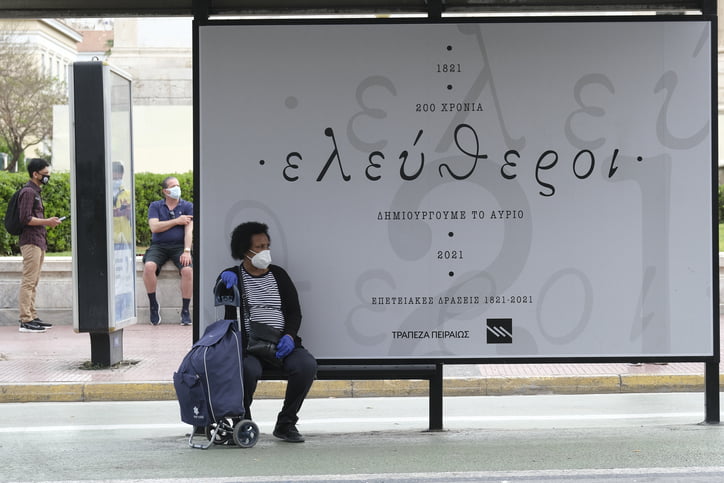
5 notes on the housing issue in Greece
1.Housing as a social right
Housing is a fundamental factor that affects a person’s everyday life as well as their social mobility. The State can’t choose to remain uninvolved in the matter, especially when certain social groups don’t have access to housing, or when they can only access really poor quality housing.
Housing’s social character became prominent with the emergence of industrial capitalism. Still, those who lived in problematic conditions had to fight, and significant shifts in political correlations had to happen, in order for housing to be perceived as a social good.
Housing was established as a social good as a part of the developing welfare system in the post-WWII era, and was part of the effort for a more equal income and wealth distribution from the ‘20s till the end of the ‘70s 1. The housing policy took the shape and form of social housing, a large amount of which was built and then let to tenants for an affordable monthly rent, mainly in Western and Northern Europe.
In Southern Europe, there was a lot less pressure to provide housing for the working class, due to the limited industrial development, as well as the workers’ migration towards the North. As a result, smaller scale social housing sectors were established, as part of the deficient local welfare systems 2. Housing needs in the South of Europe, were mostly covered using alternative solutions that replaced welfare systems, and were mostly based in the settlers’ initiatives, their families’ organisational and monetary resources and the policies that rendered the above viable.
2. The housing methods followed in Greece
In Greece, this type of “alternative” methods were the dominant model in order to cover the population’s housing needs 3. The main methods used in the post-war era were people’s self-housing and land-for-flats 4.
The former was an initial settlement solution used by poor internal migrants in the turbulent post-civil war conditions. It also functioned as a process of political discipline that rewarded the governing party followers with access to self-housing 5.
The latter method – land-for-flats – significantly increased the housing supply, thus rendering it affordable for a very large part of the population 6.
The state protected the small-scale players in the construction industry (small-scale landowners and small-scale contractors) from competition coming from big players (banks, large property owners and big construction companies) and created favourable conditions for the mass production of affordable housing 7.
Access to owner-occupied homes was a core component of the socially redistributional politics that were applied during the first post-war era, hoping to achieve political stability using clientelism. Those methods remained dominant thus predetermining roles and boundaries for all parties involved.

3. From welfare state to neoliberalism
Ever since the 1970’s, neoliberal politics have become absolutely dominant. Today, with the shrinking of the welfare state, we see that social inequalities are increasing again, almost to the extremely high degree of the early 20th century 8. Housing was one of the main components of welfare benefits that suffered a significant decrease.
The decline of the welfare state left a large amount of people who are being housed inadequately out to dry. At the same time, to summarise the neoliberal stance regarding housing policies – namely to limit the number of beneficiaries to the few who “really” need help- it led to a significant deterioration of the situation for those who still are receiving housing welfare benefits.
By setting the bar for receiving said benefits below the poverty line, the social housing areas are transformed into areas of visible poverty, social exclusion and often stigmatisation.
The fate of many such social housing complexes in Western Europe paint a vivid image of such a course 9.
In Southern Europe, changes were milder, at least till the financial crisis of 2010. Deindustrialisation had less consequences because the industry itself was comparatively limited. For the European South, the EU convergence policies that translated into significant external funding, softened the blow of economic restructuring – at least while the Community policy was trying to reach social and land convergence. When competitiveness became the EU’s main imperative though, Community funding was provided only under the condition of implementation of economic policies that were in line with the new Community targets. In Greece, the relevant course was marked by the modernisation policies that were linked with joining the Eurozone and ended in moderate adaptation policies at the beginning of the financial crisis which then was followed by the memorandum reforms.
Previously (during the ‘90s), there has been a great decrease in bank interest rates and a big boom in mortgages, which increased the purchasing power of the middle-class and the upper-middle class. This led prices to increase rapidly, thus expanding social inequalities when it comes to access to owner-occupied housing 10.
Social inequality in general and specifically in terms of housing was significantly increased during the ‘90s also because of the arrival of a large number of poor immigrants. The majority of those joined the lines of poor renters who received minimal to no protection after the abolishment of rent control and the banishment of their trade union from the public sphere. They were housed in low quality housing either in the outskirts of towns and rural areas, or in small flats in the lower floors of apartment buildings in the densely populated neighbourhoods of the city centre of Athens and a few other larger cities 11.
During the ‘90s, the increase of social inequalities and the inability of the poor to access decent quality housing were not that visible though. It was an era of economic growth, with relatively low unemployment rates even for immigrants, who managed to find some kind of work. For the local working classes, the low birth rate and their geographical stability since the ‘80s, made their housing needs less pressing.
4. Housing during the financial crisis
The 2010 financial crisis had an ambiguous effect on the housing issue. On one hand, real estate transfers froze for several years, thus maintaining the existing balance. On the other hand, it pushed a large part of the population below the poverty line. Those people ended up developing survival strategies that affected the real estate market significantly. Many people moved into smaller homes or had to move in with other relatives. Those without such options, renegotiated the amount they paid for rent, since demand was lower than before. Another contributing factor in that rent recalculation was the social profile of the homeowners in Greece. The majority are small-scale homeowners that usually depend on the rent they receive from their properties in order to increase their monthly income. Given the high taxation on properties that was imposed in 2011, small-scale homeowners were forced to accept the decrease in rent amount paid by their renters and only left their properties vacant as a last resort.

The financial crisis worsened the housing conditions and created incredibly troubling circumstances for the lower end of the social spectrum, pushing many people that till then didn’t belong to marginalised communities into homelessness 12. Still, during the first few years of the crisis, it didn’t lead to a mass loss of small-scale property, due to the property market’s stance.
Housing policies didn’t change during the first years of the financial crisis. The lack of any aid that could support those trying to access decent housing continued being the norm, with the implicit assumption that housing issues somehow sort themselves out to a great extent 13.
With the political shift after the 2015 elections, came a shift in the way the housing issue was dealt with, especially given the increased migration flow that acted as a catalyst for actions. The refugees’ housing couldn’t be left without an organised solution, even in a country where traditionally there were no housing or refugee reception policies. The increase of the number of homeless people gave more visibility as well as a social tone to the housing crisis, even though it was usually considered as a personal/ family issue.
Still, the way the housing crisis was dealt with was rather awkward and fragmentary 14. Regarding the refugees’ housing, the limited budget and the disproportionate burden that fell on Greece within the EU, led to the use of external funding and organisational help from international organisations and NGOs 15. The issue was dealt with as an emergency situation that would be resolved once the temporary residents left; a fact that contributed to the acceptance of camps as a “solution”.
The refugees’ housing showed the complete inability to manage an issue that was less temporary or precarious than it was considered to be at first. A large part of the refugees will stay in Greece, while other vulnerable groups are facing the same or similar problems. This inability concerns the limited available funds and the lack of organisational experience and know-how in a sector where direct public interventions were non-existent for decades and where state organisational institutions that could contribute in shaping housing policies and interventions (such as the Organisation for Social Housing “OEK” or the Public Corporation for Urban Planning and Housing “DEPOS”) have been dismantled during the previous decade.
Local authorities were involved in refugee housing, while there was no national housing policy. For example, the City of Athens developed important and groundbreaking initiatives on that field, while other municipalities avoided participating in the whole process, adopting a xenophobic aproach.
The issue of refugee housing would be dealt with in a much more efficient manner, if it was included in an integrated framework of policies dedicated to providing all the groups that need support with decent housing conditions 16. Actions that were implemented for vulnerable groups such as the homeless 17, were still limited and fragmentary. The housing benefit is a broader intervention in terms of the amount of beneficiaries and the necessary cost and it was established after the exemption from memorandum commitments. It is a positive measure in a country where housing support has always been unevenly favouring those who owned their home 18, while the most vulnerable are always to be found amongst the renters 19.
5. New directions on housing policies
In many European countries, the prevailing general tendency is for the public housing that is available for rent to decline, either because they’re sold, or because older blocks of flats get demolished. This is a practice that aims to relieve the State from the significant cost of social housing, assuming that most people can cover their housing needs through the free market.
For the most vulnerable groups’ problems, states developed policies that would prevent their spatial concentration in certain areas by demolishing apartment blocks or by imposing a minimum percentage of affordable housing in new construction plans. Of course the spatial redistribution of poverty by demolishing social housing blocks creates survival problems as it destroys the poorer people’s social networks, while the initiative of imposing a social housing percentage in new constructions proved to be hard to implement.
At the same time, the increasing socio-spatial inequalities create housing problems for more social groups. New teachers, nurses or police people’s households find it impossible to find houses near the areas where they work on a daily basis, such as the city centre of Paris, London and many other large cities. The gentrification processes 20, that cause the issue, are making it hard to plan and implement efficient social housing policies.

If policy-making has become harder in countries that had a developed welfare system, in Greece the situation is even more difficult due to the absence of social housing infrastructure, as well as of the relevant institutions and know-how that’d be necessary in order to tackle that problem. On the other hand, housing isn’t a priority in the political and social agenda 21, and Greece isn’t facing the same type of issues regarding the ghettoisation of poorer groups in areas of extreme deprivation where they usually resided in old, large social housing flat complexes.
Today, we can’t develop policies that belong in past eras of welfare states. The necessary funds are not available, plus their long-term results proved to be rather problematic.
Still, there are several elements that states could and should keep from the welfare policy tradition. For example, to legislate measures that have a wide range of beneficiaries helps not just to avoid stigmatisation, but also to approach housing as a global social good.
An important element of housing policies is their social targeting that should combine the primary assistance to those who need it the most, with the housing needs and contribution capacity of wider groups, thus socially linking different groups through common and sustainable solutions that would strengthen social mixing and cohabitation.
The current policy planning and implementation conditions regarding housing go beyond the old welfare prototype and the relation between supplier and beneficiaries. The actors in the relevant processes are now more and the conditions in the real estate market are changeable. This means that the current problems call for something more than simple and one-dimensional solutions. Therefore it is doubtful if the rent subsidisation that is the main housing policy measure, could achieve the expected results on its own, even if the current government didn’t order a major cut in its budget.
All of the above call for the development of housing policies in Greece that wouldn’t be focusing solely on housing and the diptych supply-beneficiaries. Housing support should be linked to other measures that would facilitate the beneficiaries’ integration to local communities (job market, local solidarity groups, professional training etc.) in the central neighbourhoods of Athens as well as in the outskirts of small towns or in villages.
The fact that in the past few years there hasn’t been an integrated policy development of that kind, might be an opportunity that was lost. The political climate that came with the change in government in 2015, which was favourable regarding the development of social policies – even within the narrow margins that the memorandums permitted- and the solidarity initiatives that sprung, combined with the international support and funding, helped develop housing support and social integration schemes. A significant asset that could add to the sustainability of such schemes in the most suffering areas of Athens’ city centre, is the large number of vacant properties 22. The empty houses, other than a necessary physical receptor for an aid program, have the advantage of being dispersed within the urban fabric, a fact that prevents the stigmatising spatial concentration of the aid’s beneficiaries.
We referred to it as a “lost opportunity” because conditions in the real estate market change very quickly. The country has become increasingly attractive to tourists and that has caused demand for accommodation to rise significantly in the Athens city centre and certain islands. The available hotel beds aren’t enough to cover that demand and as a result a significant part of the housing stock gets off the rented properties’ market. Short-term lease platforms have facilitated the relevant changes, which also led to a significant rise in the conventional rent amounts the renters have to pay 23. Said developments complicated cooperation with small-scale owners (an essential factor in potential housing and social integration schemes in Greece), as the market pushed them towards different directions. The most negative potential development would be the displacement of those who live in precarious conditions in small flats in the lower floors of apartment buildings in the city centre of Athens that are more profitable if leased via short-term lease platforms. For this vulnerable social group there is no protection nor an obvious alternative solution 24.

Then the pandemic came to shift things yet again. Just like the financial crisis, initially the pandemic had ambiguous effects. Investments in small flats came to a halt and therefore decreased the risk of eviction of poor renters that used to live there. On the other hand, by “staying at home” those who had to be confined in a very small space of poor quality that they had to share with multiple other people, were put in a very difficult situation 25. At the same time it unevenly increased the housing precariousness of those exposed to greater employment instability. Judging from the government’s choices, in the future priority shall be given to restarting the economy. Ensuring the right to decent housing – including decent housing conditions – seems to be a goal that is dependent on growth, while it isn’t unlikely for social goals to be seen as obstacles in the economic reboot effort.
The overall course of the housing issue during the past decades and the additional difficulties caused by the continuous crises that took place in the 2010s, all point to the fact that access to housing isn’t a problem that can solve itself. It calls for integrated housing and social integration policies for those excluded from the market or those that are housed problematically, unless we return to the traditional conservative point of view and accept that those who are having a hard time only have themselves to blame and therefore, deserve what’s coming.
Σημειώσεις
- T. Piketty. Capital in the 21st Century. Cambridge MA, Harvard University Press, 2014 and Β. Milanovic. Global Inequality. A New Approach for the Age of Globalization. Cambridge MA: Belknap/Harvard University Press, 2016.[↩]
- M. Ferrera. The ‘Southern’ model of welfare in social Europe, Journal of European Social Policy, 6(1), 1996: 17-37. and Τ. Maloutas, J. Allen, J. Barlow, J. Leal, L. Padovani. Housing and Welfare in Southern Europe. Oxford: Blackwell, 2004.[↩]
- Maloutas Th., Economou D. (edit.) Difficulties in the welfare state development in Greece. Spatial and sectoral approaches. Athens: Exantas, 1988.[↩]
- Leontidou, L. The Mediterranean city in transition. Cambridge: Cambridge University Press, 1990. & Antonopoulou S.. The post-war Transformation of Greek Economy and the Housing Phenomenon 1950-1980. Athens: Papazisis, 1991.[↩]
- Kalfa K. The role of American advisors in housing matters during the shaping of housing policies in Greece, announcement during the seminar Policies of (self-)housing: Greep Post-War State and the American Aid. UOA Archives, 25 September 2018.[↩]
- Maloutas Th. Flats-for-land, in Georgakopoulos Th. 10 reforms that changed Greece. Athens: Dianeosis, 2021, p. 161-189.[↩]
- Economou D. Land and housing systems in post-war Greece in Th. Maloutas, D. Economou, Difficulties in the welfare state development in Greece. Spatial and sectoral approaches. Athens: Exantas, 1988, p. 57-113.[↩]
- T. Piketty. Capital in the 21st Century. Cambridge MA, Harvard University Press, 2014.[↩]
- D.B. Hess, Τ. Tammaru, Μ. Van Ham, (eds). Housing estates in Europe. Poverty, ethnic segregation and policy challenges. Cham: Springer, 2018.[↩]
- D. Emmanuel. Socio-economic inequalities and housing in Athens: Impacts of the monetary revolution of the 1990s, The Greek Review of Social Research, 113, 2004: 121-143.
& D. Emmanuel. The Greek system of homeownership and the post-2008 crisis in Athens, Région et Développement, 39, 2014: 167-182.[↩] - Balabanidis D. Refugee housing before and after the economic crisis: Individual housing strategies, free market, public policies and civil society in Kourachanis, N. Housing and Society. Issues, Policies and Movements. Athens: Dionikos, 2019 p. 381-404.[↩]
- V. Arapoglou and K. Gounis. Contested Landscapes of Poverty and Homelessness in Southern Europe Reflections from Athens. London: Palgrave Macmillan, 2017.[↩]
- Vatavali F., Chatzikonstantinou E. Housing and access to energy: New Phenomena and answers in a changing environment in Kourachanis, N. Housing and Society. Issues, Policies and Movements. Athens: Dionikos, 2019 p.97-120.[↩]
- Kourachanis N. Social housing policies. The residual Greek approach. Athens: Papazisis, 2017.[↩]
- Kourachanis N. Housing policies for Asylum Seekers in Kourachanis, N. Housing and Society. Issues, Policies and Movements. Athens: Dionikos, 2019 p.303-332[↩]
- Kampouridis S., Platineros G. The necessity of a national strategy to combat homelessness, in Kourachanis, N. Housing and Society. Issues, Policies and Movements. Athens: Dionikos, 2019 p. 173-200.[↩]
- Dimoulas K., Arapoglou V., Gounis K., Richardson K. Pilot Registry of the Homeless in the Municipalities of Athens, Thessaloniki, Piraeus, Heraklion, Ioannina, Nea Ionia and Trikala. Athens: Panteion University, 2018.[↩]
- Emmanuel D.,Velidis S., Strousopoulou E. Housing the lower income in Greece. Athens: DEPOS, 1996.[↩]
- Sapounakis A., Komninou E. The eviction problem in Greece in Kourachanis, N. Housing and Society. Issues, Policies and Movements. Athens: Dionikos, 2019 p. 77-96.[↩]
- Lees L., Slater T., Wyly E. Gentrification. London: Routledge, 2008.[↩]
- Siatitsa D. Claims to the right to housing in cities of Southern Europe: The discourse and role of social movements, PhD thesis. Department of Urban and Regional Planning, School of Architecture, National Technical University of Athens, 2014.[↩]
- Arapoglou V., Siatitsa D. “Political Exploitations of Vacant Buildings and Residencies In Order To Cover Housing Needs” in Kourachanis, N. Housing and Society. Issues, Policies and Movements. Athens: Dionikos, 2019 p. 201-26.[↩]
- D. Balampanidis, T. Maloutas, E. Papanzani, D. Pettas. Informal Urban Regeneration as a Way Out of the Crisis? Airbnb in Athens and its Effects on Space and Society, Urban Research & Practice. 14(3), 2019: 223-242.[↩]
- Maloutas Th. The social geography of Athens. Athens: Alexandreia, 2018.[↩]
- Kandylis G. When overcrowding moved into our homes. Kathimerini, 21/04/2020. & D. Siatitsa, T. Maloutas. Housing post COVID-19 – The Greek case, in Magnier A. (ed.) Housing policies in the time of pandemic. Firenze: Firenze University Press, forthcoming[↩]



